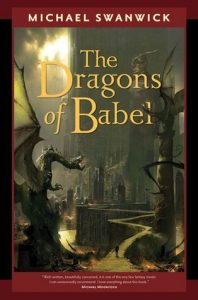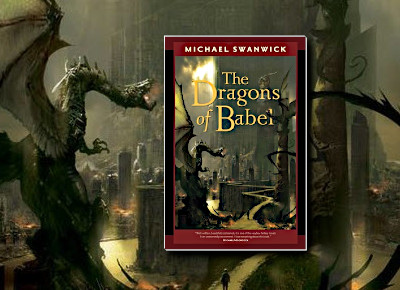THE DRAGONS OF BABEL by Michael Swanwick (Book Review)
“We high-elven are like bubbles which, rising, dissolve before reaching the surface. Our power is spiritual in essence and so as we gain strength our attachment to the world grows increasingly weaker. This is why we have affairs, why we interfere in the lives of others, why we involve ourselves in the machine rise of governance. Sex, gossip and bureaucracy are the three great forces that bind us to the world.”
The Dragons of Babel (2007) is a standalone fantasy novel set in the same world as Michael Swanwick’s earlier classic work of postmodern fantasy The Iron Dragon’s Daughter (1993). Given the stature of the original book in the minds of all those who have read it and its dizzying metafictional conceits, one would be forgiven for questioning if returning to the world of The Iron Dragon’s Daughter is even possible, let alone achievable. However, Swanwick rises to the challenge admirably. The Dragons of Babel, while inevitably not as shocking as its predecessor, is a glorious celebration of what fantasy can be, a metafictional love letter to both the folklore and the original texts that supply fantasy with its source material, and a bold re-imagining of the fantastic that reacquaints the reader with the estranging power and wonder that originally attracted us to the genre in the first place.
 The Dragons of Babel starts with that most familiar of fantasy set ups – the orphan farm boy who is the missing heir to the throne – and explores ways in which this can be made strange and unpredictable again. As with The Iron Dragon’s Daughter, this becomes a breath-taking journey through various picaresque adventures that comes together for a surprising conclusion. Along the way, Swanwick cheerfully plunders everything from Anglo-Saxon horse poems to E. R. Eddison’s The Worm Ouroboros (1922) to the Book of Revelation, all of which undergo a transmutation in his hands. Readers of The Iron Dragon’s Daughter will recognise the mixture of folklore tropes and post-industrial nightmare that made that book so striking and compelling. The real trick that Swanwick manages to pull off with these books is the way that he manages to combine elves and mythical creatures with motorbikes and shopping malls in a way that compliments and accentuates the alien-ness of both. Whatever he borrows from, he always somehow manages to give it his own distinctive twist. The intertextuality of these books is a large part of their joy; when Swanwick quotes from The Worm Ouroboros in a tourist brochure describing the monstrous train stations of Babel that have seen better days, placing the fantastic within the corporate language of the travel agencies, and then shows us the decay the edifice has fallen into, it pays tribute to an influential fantasy ur-text whilst showing us what Swanwick pulls from it and how he makes it his own. Thus the metafictional games he plays enrich both texts, rather than simply referencing the past.
The Dragons of Babel starts with that most familiar of fantasy set ups – the orphan farm boy who is the missing heir to the throne – and explores ways in which this can be made strange and unpredictable again. As with The Iron Dragon’s Daughter, this becomes a breath-taking journey through various picaresque adventures that comes together for a surprising conclusion. Along the way, Swanwick cheerfully plunders everything from Anglo-Saxon horse poems to E. R. Eddison’s The Worm Ouroboros (1922) to the Book of Revelation, all of which undergo a transmutation in his hands. Readers of The Iron Dragon’s Daughter will recognise the mixture of folklore tropes and post-industrial nightmare that made that book so striking and compelling. The real trick that Swanwick manages to pull off with these books is the way that he manages to combine elves and mythical creatures with motorbikes and shopping malls in a way that compliments and accentuates the alien-ness of both. Whatever he borrows from, he always somehow manages to give it his own distinctive twist. The intertextuality of these books is a large part of their joy; when Swanwick quotes from The Worm Ouroboros in a tourist brochure describing the monstrous train stations of Babel that have seen better days, placing the fantastic within the corporate language of the travel agencies, and then shows us the decay the edifice has fallen into, it pays tribute to an influential fantasy ur-text whilst showing us what Swanwick pulls from it and how he makes it his own. Thus the metafictional games he plays enrich both texts, rather than simply referencing the past.
The inherent problem with the chosen farm boy is that he’s a boring character. Swanwick plays with this by making Will le Fay, his half-human protagonist, a genuinely intriguing character. From the start, Will knows he is a blank slate – he has no true name, which means when one of the iron dragons crashes near his village after the death of his pilot, he chooses Will as his human intermediary. Will’s position as the dragon’s voice makes him a hated outcast in his own village, and forces him to embrace his shadow self very early on. Cast out, he travels through prisoner-of-war camps to reach the monstrous tower city of Babel. Throughout the book, Will is forced to rely on his wits to survive, gaining the education of a confidence trickster, his sense of morality always in balance with the spirit of the dragon inside him. Of course, because this is the narrative path he’s always been selected to play, the long con he and his mentor are playing to infiltrate the palace as a bogus prince so he can steal their riches and disappear before they are found out winds up putting him as the rightful heir on the Obsidian Throne. The clever thing about this is that Will’s story is different when he tells it; setting himself up as the missing prince requires him to recast his narrative and his morally grey choices as selfless and heroic, his education in statesmanship rather than that of a rogue. Swanwick essentially points out that to all intents and purposes, these skills are the same. The other result of all of this is that Will is only able to become king after a thorough education in the corrupting nature of absolute power. The return of the king will mean the death of democracy in Babel, a return to tyrannical absolute monarchy. Once Will ascends to the throne, he realises that the best thing he can do for Babel is disappear like his father before him. Thus, Swanwick cunningly crafts a narrative about the rightful heir to the throne whose very purpose is to question the validity of hereditary monarchy.
The end of the book sees Swanwick highlight the etymological link between Babel and books and libraries, echoing Jorge Luis Borges. In the light of how Will’s narrative plays out, we see that Swanwick’s Babel, as much as Borges’s, is a library, an overlapping palimpsest of different stories culled from disparate sources, the towering city a metaphor for fantasy itself, constantly overwriting and rewriting itself to better reflect the mythologies of the day. The very playfulness of The Dragons of Babel is its very serious literary intent. The joy of literature of the fantastic is that it is this vast canvas informed by mythologies, folklore and previous iterations of fantasy fiction. The challenge Swanwick drops at our feet as readers and writers of fantasy is to rewrite and reinvent the fantastic so that we can steer clear of cliché and kitsch, to better engage with the strangeness and wonder of the world around us. It becomes clear as the novel progresses that one of the texts incorporated into the book’s dizzying variety of intertextuality is Swanwick’s own The Iron Dragon’s Daughter. There is a wonderful cameo from Jane, the protagonist of that previous novel, towards the end, which shows how Swanwick’s own fantasy creation has now become part of the playground of fantastic literature, a source of vitality and inspiration to be joyously plundered for creation. The Dragons of Babel is now part of that heritage as well. Enjoy.

